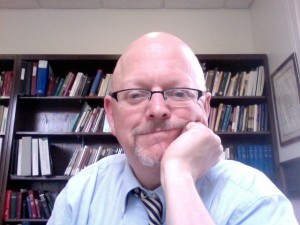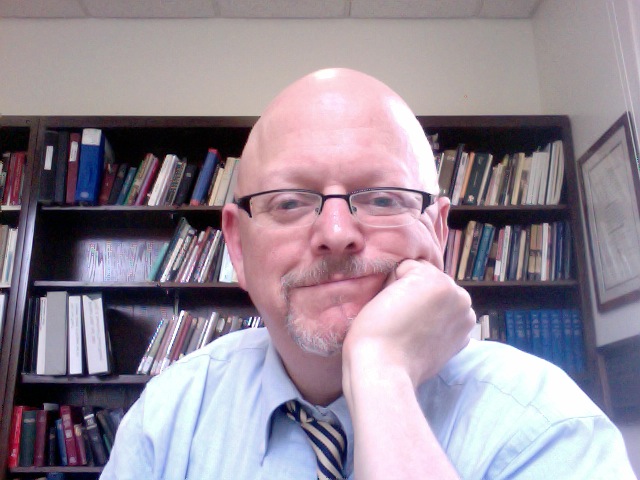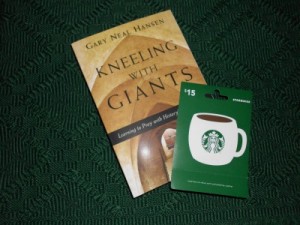 One of the greatest highs of my writing journey is making new friends. Connecting with like-minded believers is a tremendous blessing.
One of the greatest highs of my writing journey is making new friends. Connecting with like-minded believers is a tremendous blessing.
You may remember when I interviewed Chad R. Allen in November. Chad is the Editorial Director of Baker Books, and he is a ministry-minded, down-to-earth fellow with a heart for helping others.
In fact, I met Dr. Hansen by way of Chad’s blog about a month ago. (You should check out Chad’s past blog posts for more great info.!)
Dr. Gary Hansen, M.Div., Th.M., Ph.D. is the associate professor of church history at Dubuque Theological Seminary and the author of Kneeling with Giants: Learning to Pray with History’s Best Teachers (InterVarsity Press). He sports an impressive bio, but more importantly, Gary is a humble servant of Christ.
I’m delighted to have him join me today.
So grab your java, hot chocolate, or tea, kick off your shoes, and enjoy our chat! (This is one of my longest blog posts ever and I appreciate your time. I’m thrilled that you’ve joined us!)
Welcome, Gary! *cyber handshake*
Thanks so much for having me on your blog!
In two or three sentences, please tell us more about you:
I was born and raised in the state of Washington, went to graduate school at Princeton Theological Seminary in New Jersey, and then landed in the middle, taking a teaching position in Dubuque, Iowa. I love working with my students because they are already committed to serving Christ and I get to introduce them to the riches of their own heritage. My wife and I have two small children: our son is four and our daughter is two.
When did you feel God’s call to the ministry? Could you tell us a little about your salvation experience?
I was raised in a church, but it was in high school, through Young Life, that I met people who talked about Jesus as someone they loved and followed. I totally wanted that and my faith began to blossom.
As a university student in Seattle, I was eager to reach out for Christ and joined a ministry at University Presbyterian Church that trained college kids like me to lead small groups. I was hooked, but I had no Voice from On High. My call came through the parable of the talents: I realized that even without a Voice, I had gifts and needed to choose where to invest them.
What led you to write Kneeling with Giants: Learning to Pray with History’s Best Teachers?
I wrote Kneeling with Giants because I want everyone to have ways to pray that help them grow closer to the God who loves them more than they can even imagine. Christians have approached prayer in a lot of different ways over the centuries, but most people only seem to know one way that they learned at home or in their church. If that one way doesn’t “work” for them, they figure “I’m just not the praying kind.” My book invites readers to try on ten ways of praying, each one deeply rooted in a major branch of Christianity. There are solid ways to pray that will fit you, no matter who you are.
Are you currently working on additional books?
The current project I’m most passionate about is the one for which Chad Allen has been coaching me through the book proposal process on his blog. I’m looking at a bunch of historical movements that took Christian community really seriously. Community looked very different in each movement, but they all were much more serious about community than the typical church is in our culture today, and in each case community life sparked lots of outward mission and service. I want the book to be a resource for today’s churches and other ministries to rethink community, to discover new ways of being one in Christ so we grow in discipleship and mission.
Since I write fiction, I’m always interested in other authors’ creative processes. Could you please tell us about some of your writing habits? Care to share some writing tips?
The single most helpful thing I do is frequent “free writing.” I sit down with a journal and a pen–something with high quality paper, like a Molskine or Leuchtturm notebook; and a fountain pen, with a very smooth-flowing fine nib, and Waterman’s Florida Blue ink. (Not that I’m fussy or anything!) Then I just write for twenty minutes or so. If I’m trying to figure something out in a project, I may just write about it for several days till it makes sense. Or I’ll push forward with new drafty draft material. The key for me is that this lets me tell my internal editor to step aside for a while so I can get some words on paper. Once I have things written down the editor can be of use. Occasionally, something useful for a chapter or blog post comes straight out of the free writing. More often it needs lots of revision. Either way, it gets the juices rolling and I discover what I know.
A second thing that works for me is to write about whatever section suits me at the moment. I’ll develop an outline, so I know where the section goes. But the order of writing is rarely the order of reading.
What passages of scripture inspire you the most?
One is Romans 8:28, “We know that all things work together for good for those who love God, who are called according to his purpose.” I love the confidence and hope that comes from trusting that my future is in God’s loving hands.
Another is John 17 where Jesus prays so mysteriously and powerfully. He gives an amazing picture of His unity with the Father, portraying that as the model for the unity of His followers, all of which, He prays, will lead the whole world to faith.
Biggest influencer on your life?
I would say my pastor from when I was in college. Steve Hayner was a Ph.D. candidate in Old Testament as well as a pastor to university students, so his teaching was amazing and well grounded. He modeled an investment in Christ, community, and mission that I’ve always aspired to, and he believed in me before I believed in myself. (Later he became president of InterVarsity, and now he is president of Columbial Theological Seminary.)
I have to admit, religious studies were some of my toughest courses, but then again, I wasn’t a seminary student. Please tell us about some of the challenges you’ve faced in the classroom (from a professor’s eyes.)
I think one of the biggest challenges for an introvert like myself is that teaching is such a public vocation. Both the good days and the bad days are out there in front of everybody — and the bad days can live on pretty painfully in my memory. I teach survey courses in Church History, so I know a lot about some topics and less about others, and when I know only enough about a topic to give my lecture I live in dread that someone will stump me with a question.
Tell us about a life-changing experience.
When I was a college student, I eventually became the leader of the planning team for the small group leadership ministry I mentioned earlier. The team became a very effective small group. The way we worked together in ministry while supporting each other in our faith and life struggles taught me deep and lasting lessons of what community can be.
What are your future goals?
I want to be a good father to my children–to help my kids grow up to be all God intends them to be.
Related to that is my immediate hope of surviving their early childhood and the sleep deprivation they cause me!
I want to write more books. And I want them to be books that really help people love God and their neighbors in deeper more authentic ways.
It’s no secret that fiction is near and dear to my heart. Do you think one day you’d consider writing fiction? Any story ideas you’d care to share?
Telling stories is crucial to teaching and writing in history, so writing fiction regularly would probably make me a better writer. When I have written fiction (short stories, bits of a stage play and screenplay) I find it strangely exhausting and energizing all at once. I would love to spend more time and energy on fiction — though I don’t think my ideas are ready to share in public yet!
What hobbies do you have?
I love to cook — which is very handy since I love to eat. And I like to draw. The book The Art of Travel by Alain De Botton got me hooked on drawing pictures of things I see when I’m on vacation instead of taking photos. Even if you aren’t a great artist (and I’m surely not) it makes the experience of a new place really rich and vivid.
Three things you’d like to accomplish in life:
When I was a kid, at the end of every Sunday service we used to sing a hymn that included the words “…three things I pray: to see Thee more clearly; love Thee more dearly; follow Thee more nearly, day by day.” Three excellent goals, I’d say.
Thank you, Gary, for joining us! Chatting with you has been so much fun! You have been most gracious and I appreciate your time. May our Heavenly Father continue to bless you, guard, guide, and direct you.
I’m thrilled to announce that InterVarsity Press is giving away one copy of Kneeling with Giants to one random
commenter today. And for good measure, I’m throwing in a Starbucks gift card! You can read, drink, AND be inspired! Just leave a comment on today’s post and I’ll announce the winner on Wednesday, February 13th. (RULES and further info. found here.)
You can connect with Gary at his cyber home , Twitter, and Facebook. Please join me in reading, “following,” and “liking” this fellow believer and all-around-nice-fellow!
******
What person or situation had the most profound impact upon your life?
What areas of theology intrigue you the most?
Anything you’d like to ask Gary?
Photo Credit: Author photo via Dr. Gary Neal Hansen, M.Div., Th.M., Ph.D.
Blessings Always,




Comments 15
I love reading both your work 🙂
Author
Lisa, thanks! Great to have you stop by today!
What a great interview, Cynthia! Sounds like a great book from a great author!
Author
Ruthie, Gary shares a lot of great insights and I enjoyed doing this interview. Wish I’d had him as one of my professors!
I loved it when Gary said he finds writing fiction strangely exhausting and energizing all at once. Oh, I hear ya. 🙂
A situation that had a profound impact on my life–studying/interning in London. Definitely one of the most faith-building seasons of my whole life. 🙂
Author
Melissa: Wow! Interning in London–would love to hear more about that! And I’m with you and Gary about the (fiction) writing process. He summed it up beautifully, didn’t he?
Kerry: I like studying biblical history, too. It challenges us, doesn’t it? I really have to pray for fresh insight sometimes.
The “sleep deprived years” made me chuckle, too. Just when we think we’ll never know how it feels to sleep longer than a few lovely hours, we blink and our kids are no longer little. (In fact, all too soon, it’s a struggle to get them to shake a leg before school bells ring!) 🙂
Hi Cynthia!
I really appreciate this interview, and would love to read Gary’s book about prayer. I got a kick out of his answer to his future goals…surviving the sleep-deprived years. 🙂 My hubby and I have a six and eight year old, and I promise the early years do go quickly (and you will sleep again). 🙂
God Bless you both as you write for Him,
Kerry
Oh, and I love learning about the history in the Bible, and the incredibly detailed way the OT and NT tie together to show Jesus. I’m sure there’s a fancy name for it, but I appreciate learning more about this aspect of scripture. 🙂
The theology of irresistible grace always gets me digging. 🙂 I’ve never thought of drawing interesting things while traveling b/c I can’t draw, but it might be fun!
Hey, thanks Cynthia for doing this interview — and for your great input on Chad’s blog.
Thanks to all you other new friends for your comments here. Hope we can keep the conversation going…
Jessica I long held back from drawing convinced that I could not draw either. It is the process that is cool, not the product. If you TRY to draw that old building, or market scene, or forest, or whatever, you find you really SEE it as you never did before. I sort of think it would be a great practice for fiction writers–it trains you to see the shape of things as well as the details, and you have to decide what really must be in your drawing and what is better left out. Seems to me like the same problem that comes up daily in telling a story.
And I can still remember the scenes I stopped to draw, even if I never look back at my drawings. It makes a sense of place so vivid.
This is a book I definitely want to read. Thanks for sharing Gary and “Kneeling with Giants…” with us.
Very nice interview, Gary. Cynthia, I enjoyed your questions! Gary, it interested me to read about your writing process, especially that you write in sections (not necessarily in order), as that is how my sermons are usually written. I look forward to the day your book on Christian community is published. I am very much interested in the topic and am always looking for ideas on how to build community. Are you going to hold classes on the topic? 🙂
Nice to meet you pattisj — I hope you like the book! I’d love to hear your thoughts when you get hold of it.
And Ruth, nice to see you here on Cynthia’s blog. Thanks for the good wishes on my community book. Yes, a class is in the works. Teaching on the material I’m writing about worked very well for Kneeling with Giants and my little book on the Heidelberg Catechism.
Great interview, Cindy. Nice to meet you, Gary!
I love that you do free writing. I do it too. I find it’s one of the best ways my true creativity seeps out.
Author
Loree, “free writing” gives us permission to unleash all the pent-up emotion that we writers carry. I love how you put it… “my true creativity seeps out.”
So happy that you enjoyed Gary’s interview!